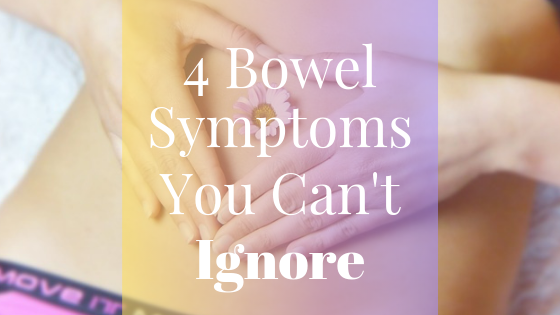Talking about bowel habits is not a glamorous topic. Yet, your bowels provide insight regarding your overall health and well-being. Analyzing changes in your bowel habits can alert you to irregular unhealthy patterns that could indicate an underlying issue. Four bowel symptoms, you shouldn’t ignore involve a change in stool appearance, frequent abdominal pain, persistent bloating, and change in frequency.
Page Contents
Changes in Stool Appearance
It is normal to experience slight changes in the texture, color, amount or scent of your stool. On average healthy bowel movements are medium to dark brown while having a soft to firm texture. Unhealthy bowel movements such as experiencing mushy, watery stools or hard, compacted difficult to pass stools can be indicators of an issue.
Experiencing mushy, watery stools could be a sign that there is inflammation within the body such as a stomach virus, food intolerance, or stress. However, if you notice that this type of bowel movement occurs on a regular basis this could indicate that you may have an underlying issue that needs to be addressed. On the other hand, struggling with constipation could signify health issues and complications.
Having either of these stool patterns present for a long time could be an indicator of a variety of issues such as Irritable Bowel Syndrome (IBS) or Inflammatory Bowel Disease (IBD). Dealing with diarrhea and frequent trips to the bathroom could also be an indicator of an overactive thyroid (hyperthyroidism).
If you are noticing black stools, or have blood in your stool on a regular basis you should first check your dietary habits. Taking iron supplements, consuming an abundance of licorice or
taking bismuth medication such as Pepto-Bismol or Kaopectate can cause you to pass black stools. Consuming beets, red berries, beet juice or tomato juice may cause your poop to turn red temporarily. If neither of these circumstances fit your particular case underlying issues could be to blame. Complications such as gastrointestinal bleeding could be the cause of the color change of your bowel movements. Having blood in your stool can also indicate an issue with hemorrhoids or anal fissures.
Frequent Abdominal Pain & Cramps
You may feel a sudden twinge or cramp that alerts you to the fact that it’s time to make a trip to the bathroom. And normally this feeling goes away after you’ve had your bowel movement. Yet, if you find that abdominal pain and discomfort is something that you experience before, during, and after your bowel movements this could be a sign of a bigger issue. This symptom could be a sign of IBS or IBD. These two conditions involve frequent abdominal pain and cramping associated with bowel movements.
If you find that you experience pain and discomfort during the process of defecating and pushing out the stool then you may have issues with hemorrhoids or anal fissures. This is a common issue for those that struggle with constipation. In addition to the pain experienced during the passing of the stool. You may notice additional symptoms such as anal itching, and bright red blood present in your stool.
Bloating & Distended Stomach
A swollen belly could be due to consuming too much high fiber foods or be caused by water retention during that time of the month. You may also find that you have issues with bloating when consuming certain foods due to food intolerance. Such as lactose intolerance or gluten intolerance. This can be addressed by transitioning these trigger foods out of your diet.

If you find that your stomach bloating occurs on a regular basis or that your bloating isn’t relieved via conventional methods such as removing trigger foods, reducing fiber intake, or the end of your period. An underlying issue could be at play such as IBS, IBD, or in some cases Ovarian Cysts. In addition to stomach bloating you may experience excessive belching, nausea, vomiting, diarrhea, fever or abdominal pain.

Change in Frequency
The number of bowel movements varies per person. On average it is normal to have a bowel movement 1 to 3 times a day. It is also normal to have a bowel movement every other day, or at the very least have a minimum of 3 bowel movements per week. You may notice slight variations due to changes in your diet, stress, or during your menstrual cycle.
Issues with frequency come into play when your normal schedule for bowel movements changes suddenly and drastically. Changes in bowel frequency come in many forms. Dealing with increased trips to the bathroom, not using the bathroom as frequently as you have before, inability to pass stool, not able to have a complete bowel movement, noticing that there are changes in the appearance of your stool, and having a sudden urge to defecate. Experiencing these changes for a period of 2 weeks or longer could indicate an issue with an underlying issue. Common conditions associated with these symptoms are IBS, IBD, hyperthyroidism, depression, anxiety and other conditions.
When to Visit Your Doctor
It’s time to visit with your doctor when you notice that you are experiencing these symptoms or a combination of these symptoms for a period of two weeks. Other symptoms that are a sign that you need to see your doctor are:
- Ongoing nausea or vomiting
- Diarrhea that lasts for 24 hours or more
- Persistent constipation that lasts for 3 weeks or longer
- Severe stomach pain and cramping
- Blood mucus or pus in the stool
- Unexplained weight loss
- Fatigue
Main Takeaway
As gross and awkward as it may be your stool and digestive habits are an indicator of your overall health and well-being. You should monitor your bowel habits and bowel movements regularly. This is especially true if you are noticing changes in your bowel habits that are out of the ordinary. Using a chart, log, or wellness journal can be helpful in monitoring these changes so you can present this information to your doctor for a proper diagnosis.
About the Author

 Hi, my name is Kathleen but you can call me Kat. I am an Esthetician, Lifestyle Wellness Coach, and Writer. My intention is to provide you with education and awareness about women’s health, nutrition, fitness, beauty, wellness, and lifestyle. I primarily help women that are seeking holistic and natural solutions to managing their chronic condition, improving their lifestyle and combating anti-aging concerns. I offer coaching programs and courses that are designed to help you redefine your health and defy aging. You can find my content on a variety of social media platforms such as YouTube,Facebook, and Instagram.
Hi, my name is Kathleen but you can call me Kat. I am an Esthetician, Lifestyle Wellness Coach, and Writer. My intention is to provide you with education and awareness about women’s health, nutrition, fitness, beauty, wellness, and lifestyle. I primarily help women that are seeking holistic and natural solutions to managing their chronic condition, improving their lifestyle and combating anti-aging concerns. I offer coaching programs and courses that are designed to help you redefine your health and defy aging. You can find my content on a variety of social media platforms such as YouTube,Facebook, and Instagram.
If you take the opportunity to visit me on my other platforms don’t hesitate to leave a message, I would love to hear from you!






